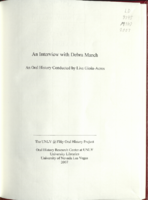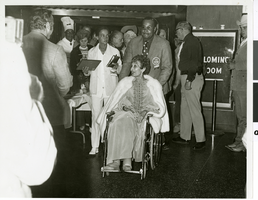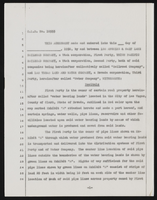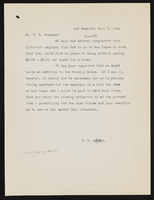Search the Special Collections and Archives Portal
Search Results
UNLV University Libraries Collection on Nevada Mining
Identifier
Abstract
The Nevada Mining Collection is comprised of records that document mining and mines in Nevada from 1842 to 1966. The majority of the collection includes records of various mines and mining companies located in the Esmeralda, Lincoln, Clark, White Pine, and Nye counties, dating from 1900 to 1928. The collection includes financial, administrative, and business related records; photographs of miners, mining camps, and towns; correspondence; maps; newspaper clippings, pamphlets, newsletters, and booklets.
Archival Collection

Meeting minutes for Consolidated Student Senate, University of Nevada, Las Vegas, July 18, 1978
Date
Archival Collection
Description
Text
Sperling Kronberg Mack Holocaust Resource Center Records
Identifier
Abstract
The Sperling Kronberg Mack Holocaust Resource Center Records (1971-2018) mainly consists of correspondence, event planning documents, financial records, subject files, and newspaper clippings created by or related to the Sperling Kronberg Mack Holocaust Resource Center and the Nevada Governor’s Advisory Council on Education Relating to the Holocaust. Materials document educational conferences, remembrance events, and student field trips; curriculum planning, involvement with the Clark County School District, and educational materials about the Holocaust and other related historical events; and grant and fundraising activities. The collection also includes photographs and proclamations.
Archival Collection

Transcript of interview with Charles Nur Fernald by Claytee D. White, May 31, 2014
Date
Archival Collection
Description
Text

Transcript of interview with Debra March by Lisa Gioia-Acres, February 21, 2007
Date
Archival Collection
Description
Text

Photograph of Judy Bayley at a public event at the Hacienda Hotel and Casino, Las Vegas, Nevada, 1971
Date
Archival Collection
Description
Image

Eric Mendoza oral history interview: transcript
Date
Archival Collection
Description
Oral history interview with Eric Mendoza conducted by Holly O'Donnell on November 29, 2021 for Reflections: The Las Vegas Asian American and Pacific Islander Oral History Project. In this interview, Eric Mendoza shares his family's chain migration history from Manila, Philippines to the United States and his difficult immigration and naturalization process once arriving in America in 1996. He talks about what brought him to live in Las Vegas, Nevada, his education and professional pursuits, what his life is like in the United States compared to that of the Philippines, and the lives of his eight siblings. Eric Mendoza discusses the historical past of the Philippines, the infrastructure in place there, and government corruption. He also speaks to Filipino traditions and festivals, food and customs, his cultural identity, and assimilating to American culture.
Text



